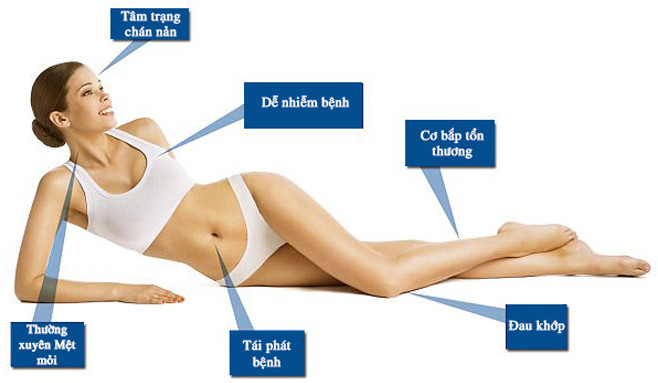Unbelievable use of sunlight
Vitamin D in sunlight not only enhances calcium absorption, but also helps supplement panacea (a curative) and placebo (a sedative).
The concept of sunbathing to absorb calcium turns out to have a scientific basis. Because in sunlight, vitamin D is beneficial for calcium absorption. Not only that, vitamin D works to strengthen the immune system, reduce skin aging.
Winter is approaching, which means the risk of vitamin D deficiency, take note of the following signs to know if your body is deficient in Vitamin D.
1. Easily infected
Winter is the season when the body is susceptible to diseases such as colds and flu. Scientific studies prove that low levels of vitamin D increase the risk of infection.
Nutritionist Kim Pearson said: "Vitamin D enhances the body's adaptability and immunity. If there is not enough vitamin D needed, immune cells will be difficult to function."
Currently, scientists are studying the role of vitamin D deficiency in the risk of cancer, especially colorectal, breast, pancreatic, prostate cancer, as well as Parkinson's disease and multiple sclerosis

Look for the following signs to know if your body is deficient in Vitamin D.
2. Depressed mood
According to Pearson: 'Vitamin D plays an important role in maintaining serotonin levels'.
Serotonin is a compound distributed in the gastrointestinal tract and the central nervous system, depressing serotonin leading to feeling bored, reducing desire or easily irritated.
In 2014, Medical Hypotheses surveyed 100 scientific articles and found a link between vitamin D deficiency and seasonal emotional disorder (SAD), in which the mood of people is easily depressed in the winter months. , lack of sunshine.
3. Frequently tired
"Vitamin D is essential for the transformation of food into energy. If you are always tired, it may be because your body does not absorb nutrients from food," Pearson said .
A placebo-controlled clinical trial, published last year in Medicine, found that vitamin D supplementation significantly improved fatigue levels.
4. Joint pain, weak bones
Vitamin D is needed to regulate calcium and phosphate in the body, playing a key role in the functioning of joints, muscles and teeth, helping to prevent soft tissue and osteoporosis.
A study in 2014 predicted that adults (over 50 years old) with vitamin D deficiency were more likely to suffer from hip pain and knee joint pain. Even pain may get worse if not treated.
5. Muscle
Vitamin D supports muscle function because its receptors are located throughout the body. After being metabolized, vitamin D enhances muscle contraction and builds muscle and bone through exercise.
In fact, researchers have found a link between chronic pain and lack of vitamin D. And vitamin D supplementation has been shown to be helpful.

Vitamin D supplements should be taken from foods instead of tablets.
People at risk of deficiency of VItamin D:
- Elderly people are at home and at home caring.
- Office workers spend most of their time inside.
- Those who cover up for religious purposes.
- People who work night shifts and sleep during the day.
How is Vitamin D supplementation?
- Sunbathing : a reasonable time to absorb enough Vitamin D from the sun is from late March or early April to the end of September, with 20 minutes a day the body will have enough vitamin D needed for bone
- Supplementing vitamins from food : fish such as salmon, mackerel or tuna contain vitamin D, in addition to chicken egg yolk, yogurt, cheese, .
- Vitamin D Tablets: Cold winter is often difficult for the sun. Therefore, many people choose vitamin D supplements based on the types of pills. However, the use of these vitamins is still a matter of controversy. So it is better to supplement Vitamin D in natural ways.
- Scientists have created artificial sunlight
- Sunlight increases the risk of suicide?
- Scientists have discovered that plastic can biodegrade under sunlight in just a few decades
- What will happen if you no longer see sunlight?
- Sunlight can reduce the amount of bacteria in your home
- The new method transforms sunlight into fuel
- Fertilizer produced by sunlight
- Metal strange sunlight suck !
- 8 unbelievable science applications from simple things
- Blind cure by sunlight
- The unbelievable truth about polar bear fur
- Surprise with unbelievable statistics about death
 Green tea cleans teeth better than mouthwash?
Green tea cleans teeth better than mouthwash? Death kiss: This is why you should not let anyone kiss your baby's lips
Death kiss: This is why you should not let anyone kiss your baby's lips What is salmonellosis?
What is salmonellosis? Caution should be exercised when using aloe vera through eating and drinking
Caution should be exercised when using aloe vera through eating and drinking